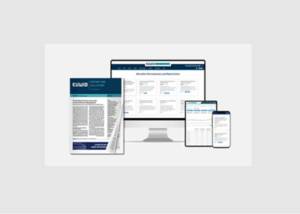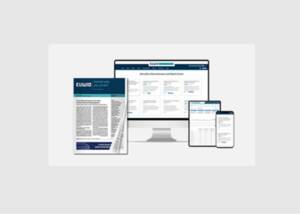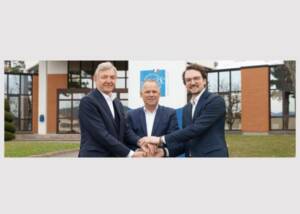UPM Half Year Financial Report 2023: Strong downturn in markets pushed Q2 results to exceptional lows – transformation continues
News General news
Q2 2023 highlights
- Sales were EUR 2,558 million (2,562 million in Q2 2022)
- Comparable EBIT decreased by 71% to EUR 114 million, 4.5% of sales (387 million, 15.1%)
- Delivery volumes were impacted by destocking in various product value chains
- Pulp and energy prices decreased to cyclical bottom levels
- Operating cash flow was EUR 459 million (-879 million), supported by cash inflow from energy hedges
- UPM Paso de los Toros pulp mill in Uruguay ramping up production according to the plan
- The OL3 nuclear power plant unit began regular commercial electricity production
- Permanent closures of PM6 at UPM Schongau, Germany and PM4 at UPM Steyrermühl, Austria

H1 2023 highlights
- Sales increased by 5% to EUR 5,345 million (5,069 million in H1 2022)
- Comparable EBIT decreased by 29% to EUR 470 million (664 million), and was 8.8% (13.1%) of sales
- Operating cash flow was EUR 1,173 million (-867 million), supported by cash inflow from energy hedges
- Net debt decreased to EUR 2,557 million (2,688 million) and the net debt to EBITDA ratio was 1.07 (1.42)
- Cash funds and unused committed credit facilities totalled EUR 6.4 billion at the end of Q2 2023
- UPM finalised its full exit from Russia
- UPM Leuna biochemicals refinery project schedule updated, start-up expected by the end of 2024 and investment estimate is EUR 1,180 million
Jussi Pesonen, President and CEO, comments on the results:
“During the first half of the year the business environment was exceptional. Geopolitical uncertainty, low economic activity and high inflation were impacting consumers. At the same time, the extraordinary destocking in product value chains continued in our industry. Consequently, we saw a strong and rapid downturn in the markets. Deliveries of our products were well below estimated end-use demand, and global commodity prices, such as pulp and energy, fell from historic highs to cyclical bottom levels in six months.
Therefore, our Q2 result was disappointing. Our sales were EUR 2,558 million, at the level of the previous year. Comparable EBIT decreased to EUR 114 million (Q2 2022: EUR 387 million). On top of market challenges, the quarterly result was impacted by high maintenance activity in UPM Fibres, UPM Energy and UPM Biofuels, as well as the normal start-up costs of UPM Paso de los Toros. Operating cash flow was a solid EUR 459 million, supported by cash inflow from energy hedges. Our balance sheet remains very strong. Net debt decreased to EUR 2,557 million. Cash funds and unused committed credit facilities totalled EUR 6.4 billion at the end of the quarter.
In Q2, market shipments for most of our products were substantially below long-term averages impacted by continued destocking. In an environment of low volumes and decreasing prices, UPM Communication Papers and UPM Plywood performed well. UPM Raflatac and UPM Specialty Papers succeeded in unit margin management, but results were weak due to continuously low volumes. Volumes for UPM Fibres and UPM Energy increased, but prices declined significantly from comparison periods.
On the positive side, in Q2 our lower variable input costs contributed positively to the result. We have responded to challenging markets by continuing agile margin management and taking swift cost cutting measures. Permanent and temporary layoffs, flexible working hours and restructuring activities are being undertaken across UPM businesses. During the quarter, UPM Communication Papers permanently closed PM6 at UPM Schongau, Germany, and PM4 at UPM Steyrermühl, Austria. The business will continue adjusting its capacity to meet profitable customer demand in line with its strategy and long-term market outlook.
With these measures and our highly competitive production assets, UPM is well placed to benefit once volumes start to recover to more normal levels.
Our strategic milestone, UPM Paso de los Toros pulp mill shipped its first customer deliveries in May and the ramp-up has proceeded well, reaching 70% run-rate in July. We expect the mill to be EBITDA positive in Q3 even with the current bottom-of-the-cycle pulp prices. With a combination of competitive wood supply, scale, best available techniques and efficient logistics, the mill is expected to reach a highly competitive cash cost level of approximately USD 280 per delivered tonne of pulp once in full production and optimised. Most of our pulp capacity is now in Uruguay, where the plantation-based business platform is not only highly competitive, but also offers further growth opportunities in various biomaterials in the long term.
Another milestone, the OL3 nuclear power plant unit started regular commercial electricity production, increasing our CO2-free electricity output by nearly 50%. In the longer term, UPM’s competitive and agile energy business platform will open growth opportunities in synthetic fuels and materials.
Our biochemicals investment project in Leuna, Germany is progressing and obtained the operating permit in May. However, the project has suffered from the exceptionally challenging investment environment with scarcity of materials and contractors. Building a first-of-its-kind biorefinery under these circumstances and making the required adjustments has been demanding and caused rescheduling and delays in the project. The completion of the investment project is now expected to take place by the end of 2024 and the cost of the project is estimated at EUR 1,180 million. The project continues with full speed. The civil construction on the site will be completed in Q3 2023. The commissioning will be implemented in phases starting in Q4 2023.
We have full confidence in a profitable biochemicals business and the technologies used at UPM Leuna. Learnings from the first refinery will benefit future scaling up of the business. On the commercial side, we have successfully created collaboration and partnerships with distributors, customers and global brands. Interest for our renewable products replacing fossil materials has proven to be high.
Detailed commercial and basic engineering studies of the potential biofuels refinery in Rotterdam continue.
All in all, the first half of the year was challenging as the world has been adjusting to new economic and political realities. Nevertheless, I am confident that UPM businesses will improve significantly when the business cycle takes a more favourable turn. The positive long-term drivers and growth prospects for UPM are intact and exciting.”
Outlook for 2023
Full-year 2023 comparable EBIT is expected to decrease from 2022. UPM’s comparable EBIT in H2 2023 is expected to be on similar level or increase compared to H1 2023.
UPM’s delivery volumes are expected to increase in H2 2023 from H1 2023. Deliveries were unusually low during H1 2023, held back by significant destocking in the various product value chains. Destocking is expected to gradually phase out during H2 2023, enabling UPM’s deliveries to recover towards the underlying end-use demand. The production ramp-up of the UPM Paso de los Toros pulp mill and the OL3 nuclear power plant unit will add to UPM’s deliveries in H2 2023.
Chemical pulp and electricity market prices were historically high during H2 2022 and declined rapidly to estimated bottom-of-the-cycle levels during H1 2023. H2 2023 starts with low pulp and electricity prices, impacting these commodity price-driven businesses. In the other businesses UPM continues to manage margins.
Variable costs are expected to decrease in H2 2023 compared to H1 2023. In addition, UPM is implementing measures to reduce fixed and variable costs.










